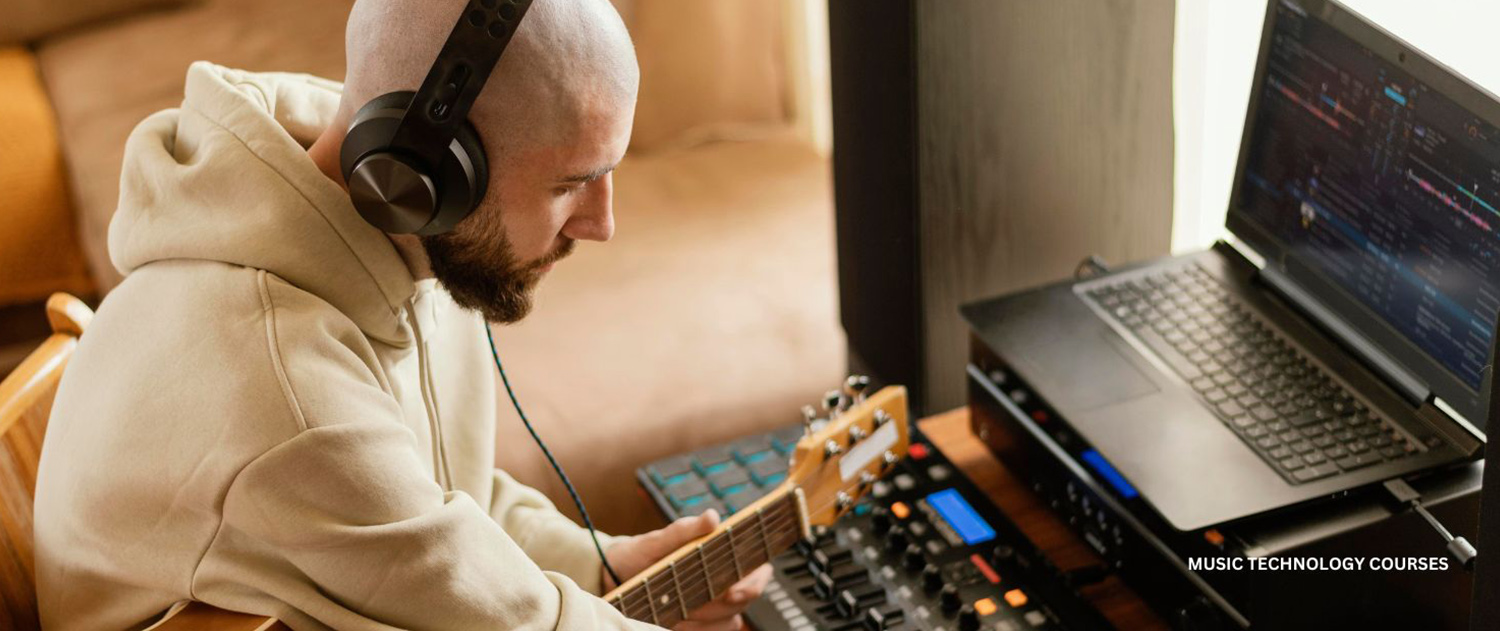Course Overview
The Diploma in Music Production is a comprehensive program designed for aspiring music producers, Composers, Singer-Song writers and Audio Enthusiasts. This course covers every aspect of music production, from recording techniques and sound design to mixing and mastering.Decades of training experiences and being part of the Indian Music Industry, we have understood the pulse and requirements of artists and have developed this program to enhance their skill sets to strive with confidence in this competitive creative industry.
Course Duration
- Duration: 1 year
- Mode: Full-time
Eligibility
- Prerequisites: Basic knowledge of music and familiarity with at least one musical instruments.
- Qualification: High school diploma or equivalent.
Learning Outcomes
By the end of this course, students will:
- Have solid Foundation in Music Production.
- Be proficient in using Digital Audio Workstations (DAWs) like Logic Pro, ProTolols etc.
- Develop skills in producing music, arrangement of tracks, Structure of various music styles, Genres and approaches.
- Session management, Discipline to maintain while working in creative environment,Ear training.
- Familiarisation with industry standard Virtual Instruments such as Kontakt Player by Native Instruments and Spectrasonics Bundles etc.
- Learn how to work with Samples and Loops.
- To work on Hardware Synthesis and Various Keyboard types.
- Create and produce original music tracks.
- Collaborate effectively in a studio environment.
- Pitch Correction or vocal tuning using software such as Celemony Melodyne or Logic Pro X Flex tool.
- Vocal Processing and Sound Designing.
- Recording, Mixing and Rough Master.
- Understand the business aspects of the music industry, including copyright, licensing, and distribution.
Course Modules
1. Music Theory (Trinity Grades 1-5)
- Understanding scales, chords, and harmony
- Time Signature and Rhythmic Styles
- Song structure and composition techniques
2. Digital Audio Workstations (DAWs)
- Overview of Logic Pro X and Protools
- Setting up a home studio
- DAW interface navigation and workflow
3. Sound Design & Synthesis
- Introduction to sound waves and frequencies
- Using synthesizers and virtual instruments
4. Recording Techniques
- Microphone types and placement
- Recording vocals, instruments
- Midi Sequencing
- Managing recording sessions
5. Mixing Essentials
- Working with Headphones vs Speakers.
- Understanding our ears and our taste for music
- EQ, compression, and effects
- Panning and stereo imaging
- Static Mix, Gain Staging
- Automation and creative effects
- Mixing for different genres
- Understanding loudness and dynamics
6. Film Score
- Introduction to Film scoring
- Roles and Responsibilities of a Composer vs Producer vs Engineer.
- Spotting and Time code
- Emotion and Instrument palette for effective scoring
- Working with Templates and making your on samples and hierarchy
7. Mastering
- Preparing tracks for mastering
- Mastering tools and techniques using Artificial Intelligence and Manual method.
- Finalizing tracks for distribution
8. Music Business and Marketing
- Copyright and intellectual property
- Distribution platforms (Spotify, Apple Music, etc.)
- Branding and promoting your music
9. Collaborative Projects
- Working in teams to produce music
- Working with Audio Engineers in Studio Environment and in Live Sound Engineering scenarios.
- Live Performance
- inal project: Produce an EP or Original Song, Score or Ad, Cover Song or Instrumental.
10. Portfolio Development
- Creating a professional music production portfolio
- Networking and career opportunities
- Job preparation (resumes, interviews)
Assessment
- Assignments: Regular project-based assignments.
- Examinations: Internal and final exams.
- Portfolio Review: Final portfolio presentation.
- Capstone Project: Produce and present a final music project.
Career Opportunities
Graduates of the Diploma in Music Production can pursue careers in:
- Music Production
- Assistant Producer
- Studio Engineering
- Film Scoring
- Live Performance
- Music Entrepreneurship
Why Choose Our Program?
- Hands-on training with industry-standard tools and equipment.
- Faculty with real-world experience in the music industry.
- Opportunities for collaboration and networking.
- Access to state-of-the-art recording studios and software.
- Support in developing a professional portfolio and career guidance.

